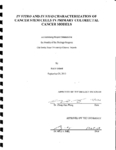- DSpace Home
- →
- Channel Islands
- →
- Academic Affairs
- →
- Masters Theses and Projects
- →
- Biotechnology & Bioinformatics
JavaScript is disabled for your browser. Some features of this site may not work without it.
| dc.contributor.author | Gehani, Rohit | en |
| dc.date.accessioned | 2010-11-16T02:37:23Z | en |
| dc.date.available | 2010-11-16T02:37:23Z | en |
| dc.date.issued | 2010-09-25 | en |
| dc.identifier.uri | http://hdl.handle.net/10139/2959 | en |
| dc.description.abstract | The existence of cancer stem cells (CSC) postulates that tumors are organized as a cellular hierarchy and that tumor initiation, growth and cellular heterogeneity are driven by a subset of cells with stem cell like properties. The CSCs are endowed with the ability to self-renew and thereby to proliferate indefinitely. At a functional level, CSCs are characterized by their ability to regenerate in vivo from a single cell into the full spectrum of histology of the tumor of origin and to form spheroid colonies in vitro in an anchorage independent environment. The specific aims for this project include setting up assays that will enable the quantification and the characterization of CSCs and evaluating cell surface markers to enrich for CSC. Additionally, in our in vivo assays, we will compare different mice strains as hosts to our in vivo assays. In order to assess the frequency of CSCs within a solid tumor, we established an in vitro and in vivo limited dilution assay (LDA). A known number of cells were seeded in a low attachment well with stem cell growth media, and the number of spheroids that grew was counted by Optronix GelCount. In an in vivo LDA, immune deficient mice were inoculated with a specific number of cells, and the number of tumor bearing mice was counted. In order to optimize our methods, immortalized colorectal cancer (CRC) cell lines COLO205 and T84 were used as tools to develop LDAs. We were able to determine that the sphere and tumor-forming efficiency of COLO205 was superior to T84, resulting in the primary use of COLO205 cells for assay development. We also aimed to compare the tumor initiating capacity of the COLO205 cell line in order to investigate the effect of the mouse immune system on the read-out of the in vivo tumor formation assay. The result of this experiment was inconclusive; no tumors grew, which is a defect that we could pinpoint to a loss of viability of sorted tumor cells by FACS. We worked with four colorectal cancer models derived from patient tumors and continuously passaged in immune deficient mice. Two models were established from primary tumors obtained from the Amgen Tissue Bank. These tumors were dissociated and cultured in serum-free stem cell growth media on low attachment plates. The other two models were obtained from a company that had continuously passaged the tumors in immune deficient mice. We used these two models to test mouse immune background and effects of irradiation on tumor initiation. Antibodies to extracellular proteins epithelial cell adhesion molecule (EpCAM) and CD133 were used to enrich for a homogenous population of CSCs by sorting protocols. We could not confirm that either of these is a good marker but did find that FACS sorting may affect tumorigenicity and viability of CSCs in our CRC models. The outcome of the CSC enrichment procedure will be important to enable further characterization at the molecular and cellular level of CSC and the identification of potential therapeutic targets that could selectively eliminate CSCs. iv | en |
| dc.language.iso | en_US | en |
| dc.rights | All rights reserved to author and California State University Channel Islands | en |
| dc.subject | Biotechnology & Bioinformatics thesis | en |
| dc.subject | Cancer stem cells | en |
| dc.subject | Colorectal cancer | en |
| dc.subject | Limited dilution assay | en |
| dc.title | In Vitro and In Vivo Characterization of Cancer Stem Cells in Primary Colorectal Cancer Models | en |
| dc.type | Thesis | en |

